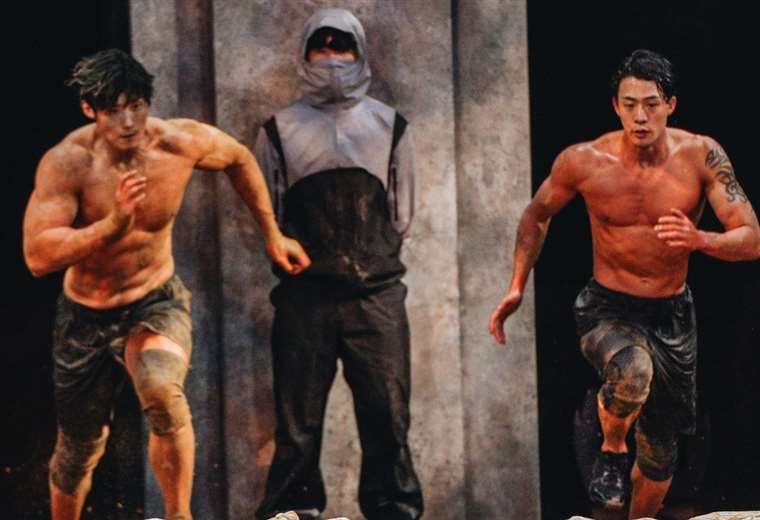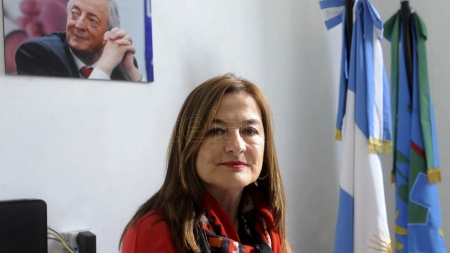February 21, 2023, 8:04 AM
February 21, 2023, 8:04 AM
It all started with the search for the “ultimate physique.”
the netflix series Physical: 100 Has Been A Big Hit With Global Audiences – Korean Survival Show headed the list of seriesyes non-english global tv during the week of February 6-12 and appeared in the Top 10 in 78 countries around the world (there is only one English-language show that is more popular).
It is also the first reality show from South Korea to rank #1 on Netflix.
in the show, 100 contestants in the best physical shape of their specialties compete for the title of “ultimate physique”.
The last surviving member wins 300 million Korean won (about US$230,000). The winner will be announced in the final episode on February 21.
Although viewers have noted some similarities to Squid Game (“The Squid Game!), the show is also unique in its own right, unlike anything we’ve seen before: a simpler format of naked bodies fighting each other regardless of age, gender or race.
It is possible that have to hang from a bar for a longer timesteal the ball from another contestant or drag a two-ton boat through a large room covered in sand.
fans describe Physical as a “positive” survival program. “It’s more than just see cool boys and girlsElodie Wu, who has been following the series from France, told the BBC.
“I like certain values that it conveys about team spirit, great achievements, mental and physical resilience. In comparison with the reality shows Westerners, people don’t criticize other contestants. He’s competitive and fierce, but he’s still very positive.”
Here are six highlights of the program.
1. The first reality show from its creator
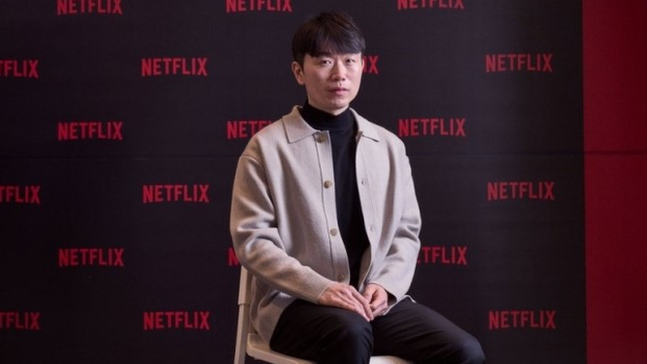
The hit series was created by Jang Ho Gi, a producer at one of South Korea’s major TV stations who has spent his entire career making documentaries, serious pieces that cover social crimes and complex frauds.
This was his first reality show -making it cBecome the most successful Korean reality show funded by Netflix – and received the green light in just two weeks.
“The proposal was simple and promising”said the Netflix contact who first read the email proposal.
2. No subtitles
Thanks to the experience of his creator in the production world of documentaries, Physical: 100 he maintains a very strict focus on the main action.
More than 200 cameras are used to capture every bead of sweat, every flex of muscle and tendon. Special cameras, some high-speed, are used to capture every fraction of a second of the participants’ facial expressions and body movements.
It’s a very different approach than the hit reality shows that had been done before in South Korea, which largely relied on subtitles, image footnotes, and graphics.
The lack of a celebrity host or panel was also intentional and is another element that sets the show apart.
and it is believed that this is one of the success factors that attracted a global audience.
The focus on the body with simple games was intuitive enough for foreign viewers to understand, even if they don’t know the language.
3. It doesn’t air in Korea
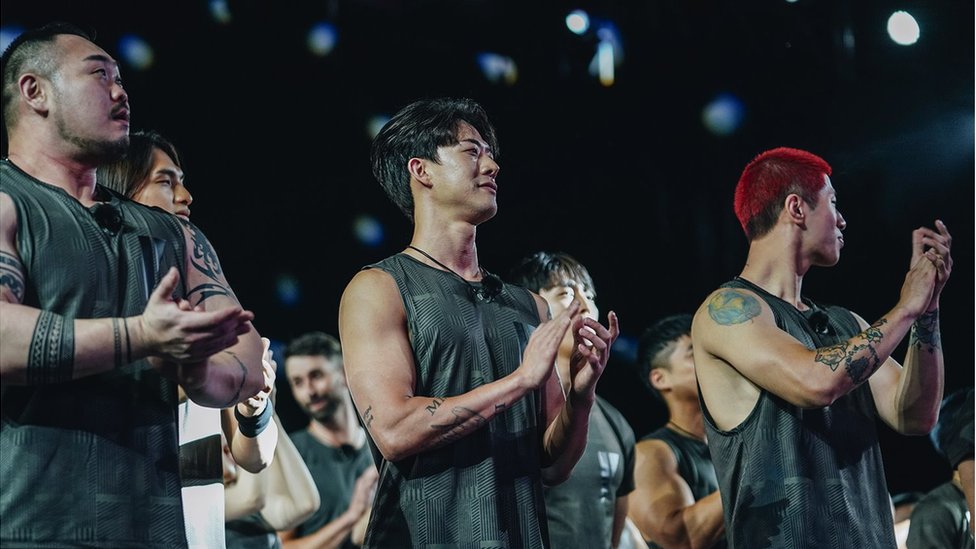
The series’ creator, Jang, still works for South Korea’s leading broadcaster MBC, which co-produced the show.
But Jang told the story to Netflix, Netflix fully funded the show and the show only airs on that platform.
Many experts say that it would have been impossible to broadcast this hit series world in korea As a public broadcaster, MBC would have had to hide all of the contestants’ tattoos, as per the general practice of not disturbing certain viewers.
Although the tattoos are fading becoming more and more popular, especially among the younger generation, in the past they have been strongly associated with gangs or crime.
Korea’s attitude towards tattoos is so conservative that only doctors can legally ink them.
The bad words, which are pronounced frequently during grueling challenges, they would have to be covered with bleeps or removed to comply with broadcast regulations. The words translated as “damn” would never have made it to the mainstream media.
4. A real “Squid Game”
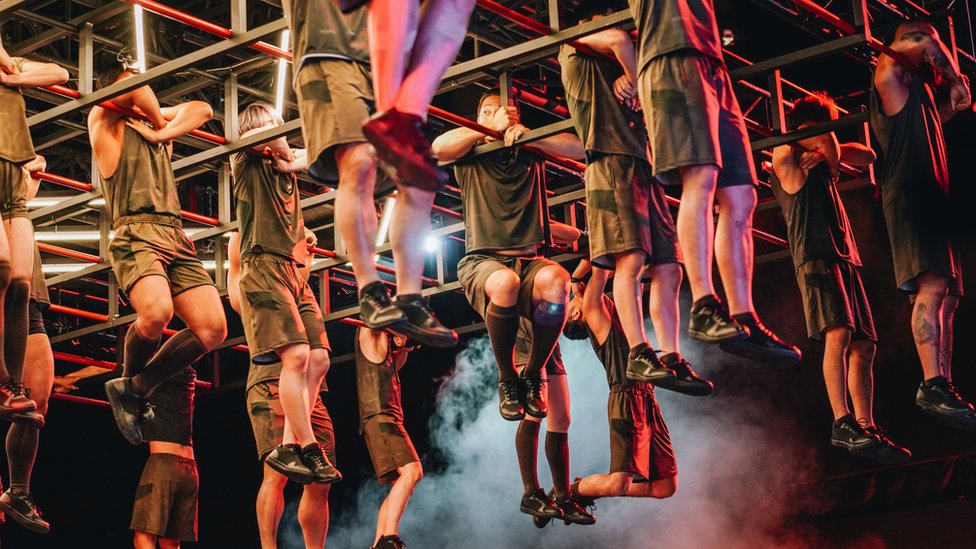
Many viewers will immediately notice the show’s similarities to a previous (fictional) hit Korean TV series: Squid Game. In fact, the contestants themselves have commented that it is “like Squid Game“.
The survival format that involves taking down a last contestant who wins a large sum of money is the central theme of both programs.
The simplicity of the tests (children’s games in Squid Game and feats of strength in Physical:100) also connects the two.
Jang mentioned in a recent press conference that he intended to make the setting “surreal” while dealing with humans in real life. “Like Squid GameI expected the show to be a cross between reality and fantasy,” he said.
Music director Kim Sung-soo too participated in the soundtrack of “Juego del squid”
5. Diversity
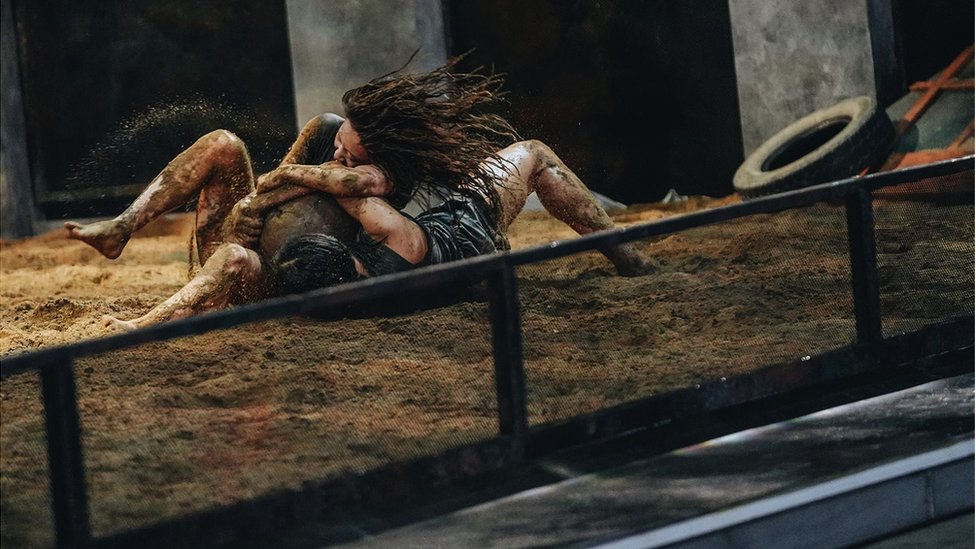
The program is committed to finding the ultimate physique, regardless of age, gender, or race.
And that’s exactly what it focuses on. The height of the contestants ranged from 1 meter 50 cm to 2 meters; the weight from 40 kg to 130 kg.
The diminutive 2012 Olympic vault champion Yang Hak-seon, whoYou are 1.60 m tall and weigh 51 kg, he found himself competing between burly professional mixed martial arts fighters and elite ex-agents of the Korean Army.
And 23 women of different body sizes demonstrated their physical and mental strength.
There were few non-Koreans, often referred to as “the foreigners” on the show, an aspect that might need to be reconsidered if the show were to produce a sequel with broader appeal.
Jang already revealed in a recent press conference that he wanted to cover all the world’s physicists in the future, either by continent or cultural area.
6. Controversy
However, some scenes have caused controversy.
In a, a male contestant he chose a female bodybuilder in a one-on-one match and then pressed his knee into her chest.
The bodybuilder later said on her Instagram account: “It was a survival show and it was fair.” However, she did say that she would take legal action against malicious commenters who sexually harassed her or edited images of her.
As the show gained popularity around the world, there were also claims and counterclaims of joint production deals.
Content provider Ascendio claimed in a January report that it was involved in the production of Physical: 100 and got a big boost in terms of stock price. However, MBC and co-producers Luyworks Media denied this claim.
The matter is likely to be resolved in court.
